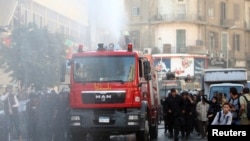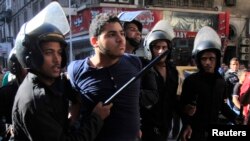CAIRO —
Egyptian police fired teargas and water cannon to disperse hundreds of protesters in Cairo on Tuesday after they defied a new law that restricts demonstrations.
Protesters gathered to commemorate the death of a liberal activist killed in clashes with police two years ago, challenging the new legislation passed on Sunday that bans protests without police approval.
Hundreds assembled at the Press Syndicate and parliament, both in central Cairo. “Down, down with military rule,” they chanted. Around 20 people were detained, the state news agency reported.
Human rights groups have condemned the law as a major blow to freedom in Egypt, the most populous Arab state and a U.S. ally which has experienced near relentless upheaval since autocratic ruler Hosni Mubarak was toppled by a revolt in 2011.
Under the law, protests at places of worship are banned and the Interior Ministry has the right to forbid any public meeting of more than 10 people.
“[The] new protest law gives security forces free rein,” Amnesty International said.
The United States, which has partially frozen aid to Egypt, on Monday expressed concern over the new law and said it agreed with groups that argued it does not meet international standards and hampers the country's move toward democracy.
Cairo responded by saying it was unacceptable for any country to interfere in its internal affairs.
A security official said Tuesday's crowd had not obtained permission to protest and had ignored warnings to disperse.
The army-backed government has said it is not against peaceful protests but wants to restore order in the streets. It has also complained that protests often disrupt traffic.
“We are implementing the new protest law that requires protesters to seek permission from the Interior Ministry three days before the protest,” a police official said.
Egypt has stumbled in its path to democracy since the fall of Mubarak, with the army ousting the country's first freely elected president, Mohamed Morsi of the Muslim Brotherhood, on July 3, after mass protests demanding early elections.
The law will further squeeze members of the Muslim Brotherhood, who have said they will continue protesting against what they say is a military coup.
The military has presented a roadmap it says will lead to parliamentary and presidential elections in Egypt, which has a peace treaty with Israel and contains the strategic Suez Canal.
A 50-member committee is expected to next week finish re-writing the constitution, which will be put to a referendum, likely to be next month. At the same time, security forces have mounted one of the fiercest crackdowns on Islamists in decades.
Hundreds have been killed by police and army troops and the Brotherhood's leadership has been arrested.
Morsi's supporters held protests in different cities in Egypt on Tuesday. In Cairo, female students at Al-Azhar University for Islamic learning, which follows the government line, stormed into a dean's office and destroyed her desk.
Protesters gathered to commemorate the death of a liberal activist killed in clashes with police two years ago, challenging the new legislation passed on Sunday that bans protests without police approval.
Hundreds assembled at the Press Syndicate and parliament, both in central Cairo. “Down, down with military rule,” they chanted. Around 20 people were detained, the state news agency reported.
Human rights groups have condemned the law as a major blow to freedom in Egypt, the most populous Arab state and a U.S. ally which has experienced near relentless upheaval since autocratic ruler Hosni Mubarak was toppled by a revolt in 2011.
Under the law, protests at places of worship are banned and the Interior Ministry has the right to forbid any public meeting of more than 10 people.
“[The] new protest law gives security forces free rein,” Amnesty International said.
The United States, which has partially frozen aid to Egypt, on Monday expressed concern over the new law and said it agreed with groups that argued it does not meet international standards and hampers the country's move toward democracy.
Cairo responded by saying it was unacceptable for any country to interfere in its internal affairs.
A security official said Tuesday's crowd had not obtained permission to protest and had ignored warnings to disperse.
The army-backed government has said it is not against peaceful protests but wants to restore order in the streets. It has also complained that protests often disrupt traffic.
“We are implementing the new protest law that requires protesters to seek permission from the Interior Ministry three days before the protest,” a police official said.
Egypt has stumbled in its path to democracy since the fall of Mubarak, with the army ousting the country's first freely elected president, Mohamed Morsi of the Muslim Brotherhood, on July 3, after mass protests demanding early elections.
The law will further squeeze members of the Muslim Brotherhood, who have said they will continue protesting against what they say is a military coup.
The military has presented a roadmap it says will lead to parliamentary and presidential elections in Egypt, which has a peace treaty with Israel and contains the strategic Suez Canal.
A 50-member committee is expected to next week finish re-writing the constitution, which will be put to a referendum, likely to be next month. At the same time, security forces have mounted one of the fiercest crackdowns on Islamists in decades.
Hundreds have been killed by police and army troops and the Brotherhood's leadership has been arrested.
Morsi's supporters held protests in different cities in Egypt on Tuesday. In Cairo, female students at Al-Azhar University for Islamic learning, which follows the government line, stormed into a dean's office and destroyed her desk.






